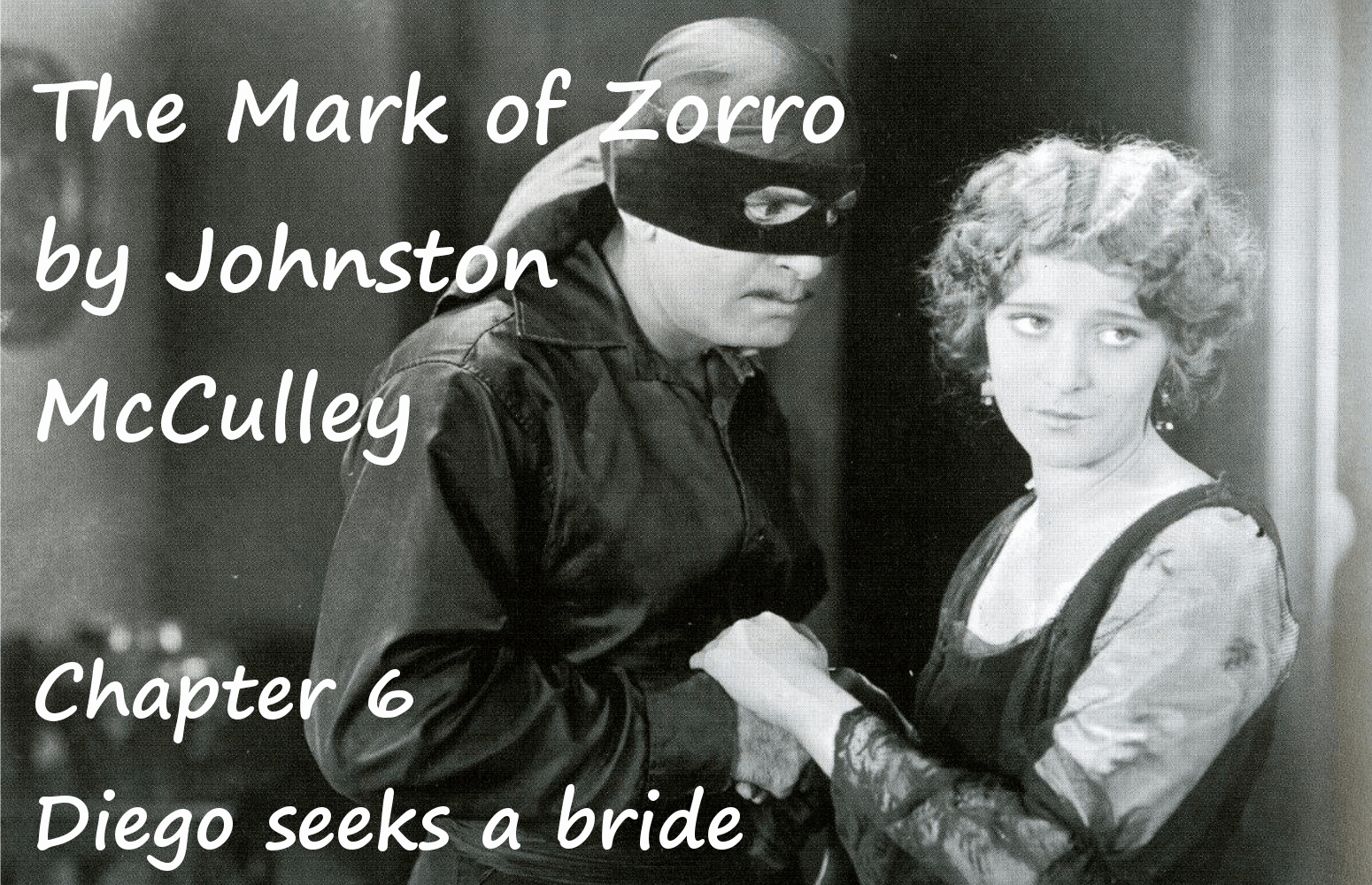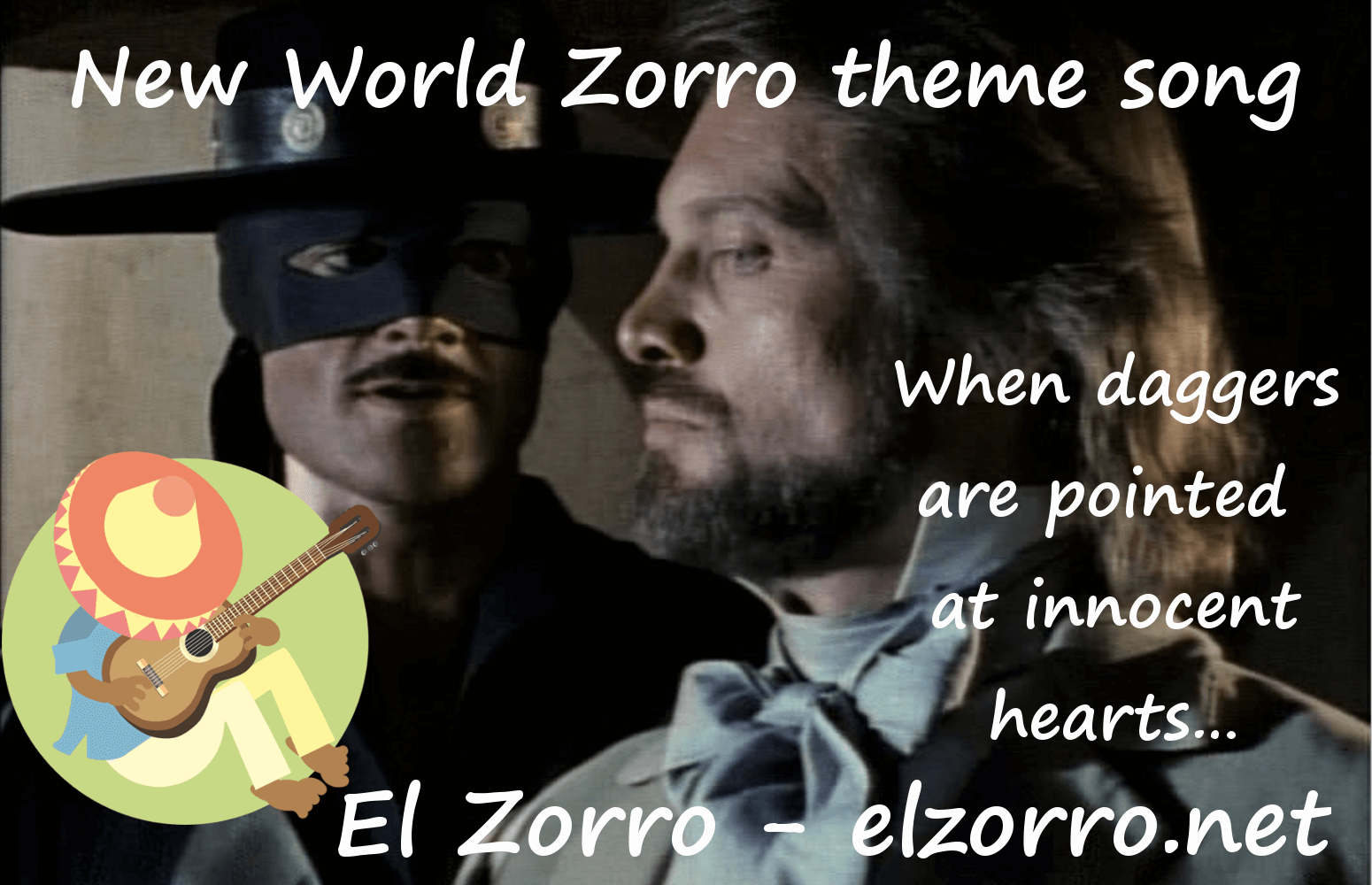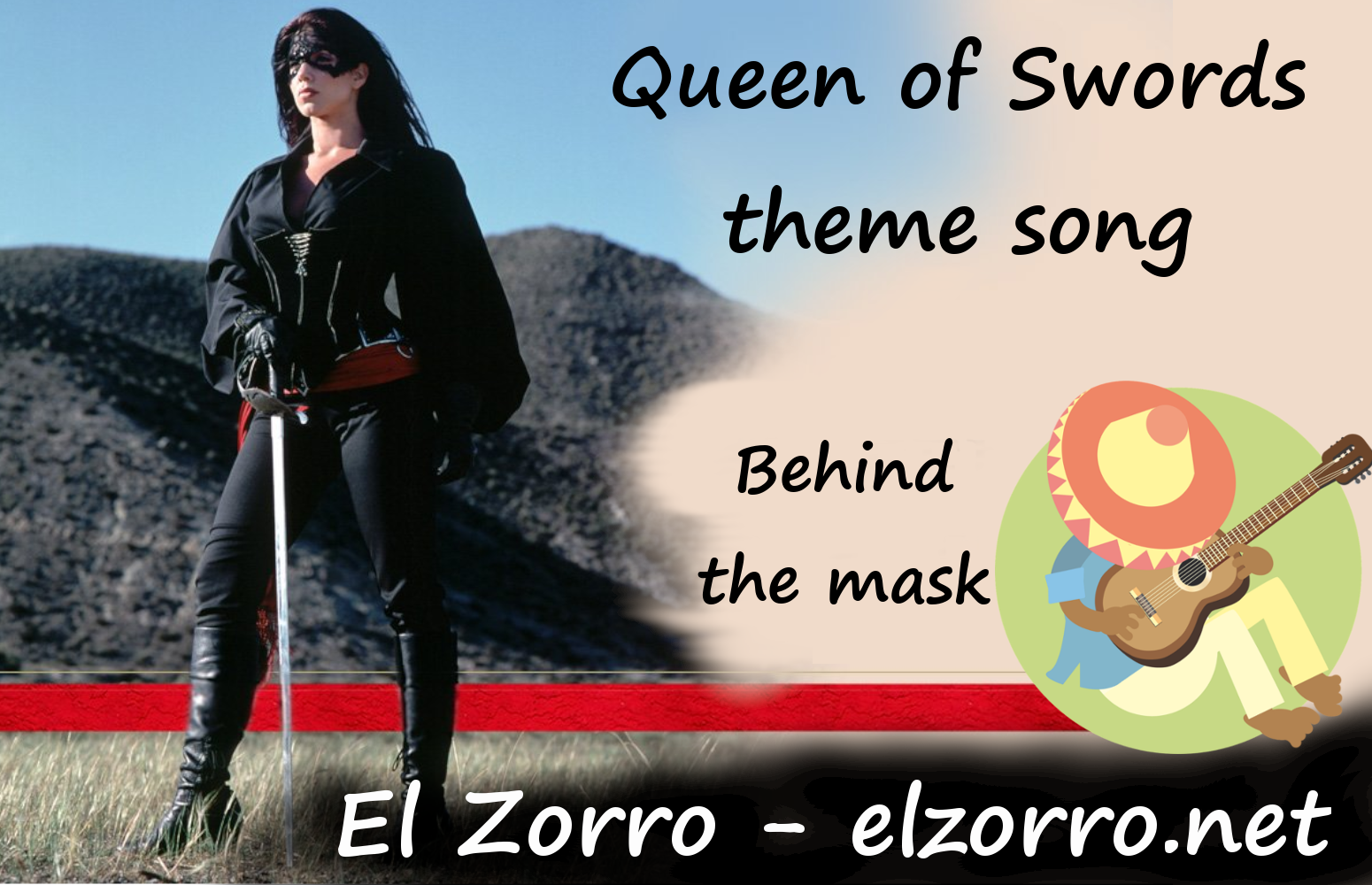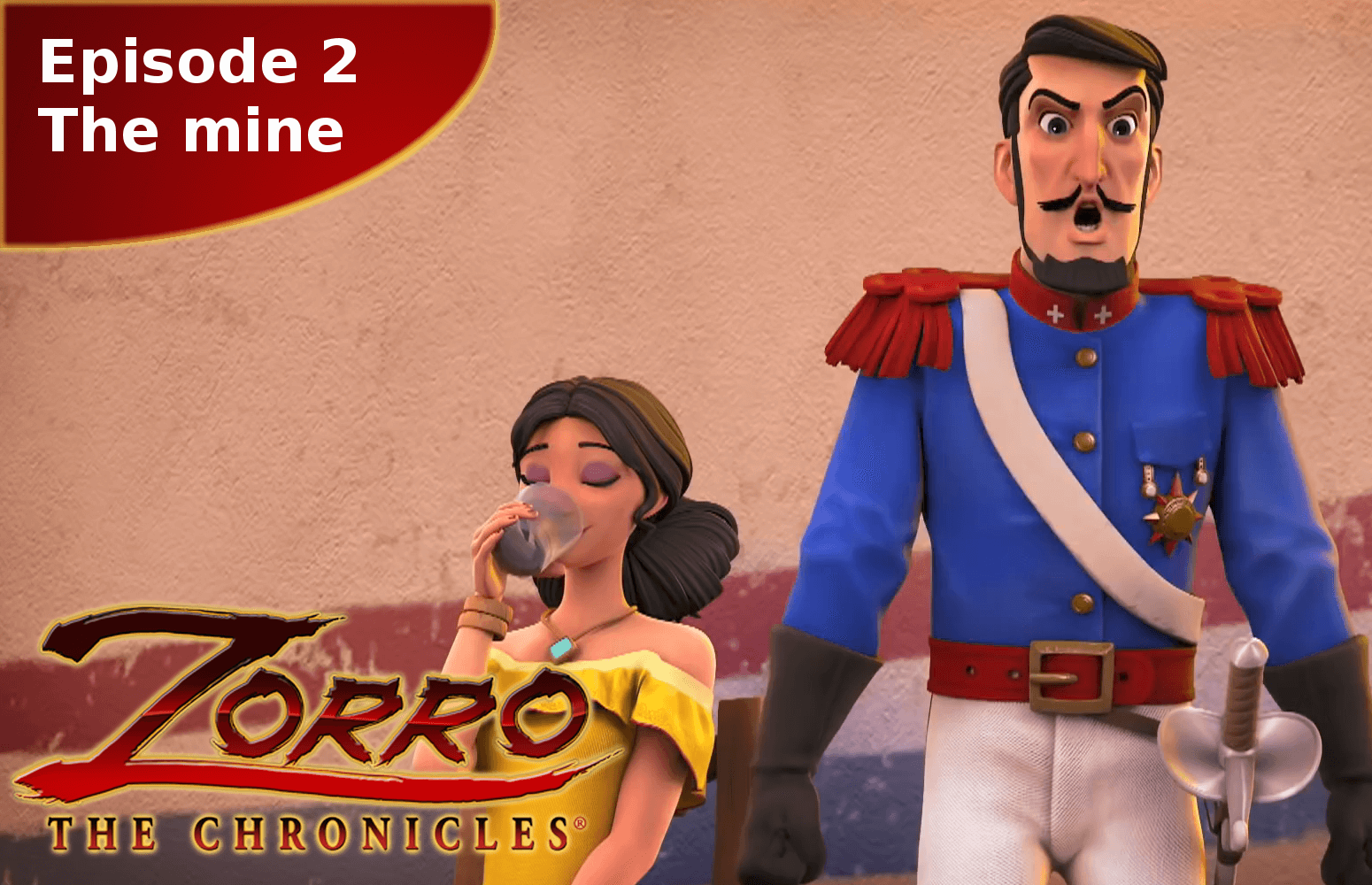The Mark of Zorro chapter 6 Diego seeks a bride
Mark of Zorro chapter 6 Diego seeks a bride
Author McCulley, Johnston, 1883-1958
Title The Mark of Zorro
Note Published serially under the title: The curse of Capistrano.
Language English
Copyright Status Public domain in the USA.
Don Diego sipped his wine slowly and looked out across the mesa, and Don Carlos looked at him in puzzled fashion, realizing that something was coming, and scarcely knowing what to expect.
“I did not ride through the damnable sun and dust to talk with you concerning this Señor Zorro, or any other bandit,” Don Diego explained, after a time.
“Whatever your errand, I am glad to welcome one of your family, caballero,” Don Carlos said.
“I had a long talk with my father yesterday morning,” Don Diego went on. “He informed me that I am approaching the age of twenty-five, and he is of a mind that I am not accepting my duties and responsibilities in the proper fashion.”
“But surely—”
“Oh, doubtless he knows! My father is a wise man.”
“And no man can dispute that, Don Diego!”
“He urged upon me that I awaken and do as I should. I have been dreaming, it appears. A man of my wealth and station—you will pardon me if I speak of it—must do certain things.”
“It is the curse of position, señor.”
“When my father dies I come into his fortune, naturally, being the only child. That part of it is all right. But what will happen when I die? That is what my father asks.”
“I understand.”
“A young man of my age, he told me, should have a wife, a mistress of his household, and should—er—have offspring to inherit and preserve an illustrious name.”
“Nothing could be truer than that,” said Don Carlos.
“So I have decided to get me a wife.”
“Ha! It is something every man should do, Don Diego. Well do I remember when I courted Doña Catalina. We were mad to get into each other’s arms, but her father kept her from me for a time. I was only seventeen, though, so perhaps he did right. But you are nearly twenty-five. Get you a bride, by all means.”
“And so I have come to see you about it,” Don Diego said.
“To see me about it?” gasped Don Carlos, with something of fear and a great deal of hope in his breast.
“It will be rather a bore, I expect. Love and marriage, and all that sort of thing, is rather a necessary nuisance in its way. The idea of a man of sense running about a woman, playing a guitar for her, making up to her like a loon when every one knows his intention!
“And then the ceremony! Being a man of wealth and station, I suppose the wedding must be an elaborate one, and the natives will have to be feasted, and all that, simply because a man is taking a bride to be mistress of his household.”
“Most young men,” Don Carlos observed, “delight to win a woman, and are proud if they have a great and fashionable wedding.”
“No doubt. But it is an awful nuisance. However, I will go through with it, señor. It is my father’s wish, you see. You—if you will pardon me again—have fallen upon evil days. That is the result of politics, of course. But you are of excellent blood, señor, of the best blood in the land.”
“I thank you for remembering that truth!” said Don Carlos, rising long enough to put one hand over his heart and bow.
“Everybody knows it, señor. And a Vega, naturally, when he takes a mate, must seek out a woman of excellent blood.”
“To be sure!” Don Carlos exclaimed.
“You have an only daughter, the Señorita Lolita.”
“Ah! Yes, indeed, señor. Lolita is eighteen now, and a beautiful and accomplished girl, if her father is the man to say it.”
“I have observed her at the mission and at the pueblo,” Don Diego said. “She is, indeed, beautiful, and I have heard that she is accomplished. Of her birth and breeding there can be no doubt. I think she would be a fit woman to preside over my household.”
“Señor?”
“That is the object of my visit to-day, señor.”
“You—you are asking my permission to pay addresses to my fair daughter?”
“I am, señor.”
Don Carlos’s face beamed, and again he sprang from his chair, this time to bend forward and grasp Don Diego by the hand.
“She is a fair flower,” the father said. “I would see her wed, and I have been to some anxiety about it, for I did not wish her to marry into a family that did not rank with mine. But there can be no question where a Vega is concerned. You have my permission, señor.”
Don Carlos was delighted. An alliance between his daughter and Don Diego Vega! His fortunes were retrieved the moment that was consummated. He would be important and powerful again!
He called a native and sent for his wife, and within a few minutes the Doña Catalina appeared on the veranda to greet the visitor, her face beaming, for she had been listening.
“Don Diego has done us the honor to request permission to pay his respects to our daughter,” Don Carlos explained.
“You have given consent?” Doña Catalina asked: for it would not do, of course, to jump for the man.
“I have given my consent,” Don Carlos replied.
Doña Catalina held out her hand, and Don Diego gave it a languid grasp and then released it.
“Such an alliance would be a proud one,” Doña Catalina said. “I hope that you may win her heart, señor.”
“As to that,” said Don Diego, “I trust there will be no undue nonsense. Either the lady wants me and will have me, or she will not. Will I change her mind if I play a guitar beneath her window, or hold her hand when I may, or put my hand over my heart and sigh? I want her for wife, else I would not have ridden here to ask her father for her.”
“I—I—of course!” said Don Carlos.
“Ah, señor, but a maid delights to be won,” said the Doña Catalina. “It is her privilege, señor. The hours of courtship are held in memory during her lifetime. She remembers the pretty things her lover said, and the first kiss, when they stood beside the stream and looked into each other’s eyes, and when he showed sudden fear for her while they were riding and her horse bolted—those things, señor.
“It is like a little game, and it has been played since the beginning of time. Foolish, señor? Perhaps when a person looks at it with cold reason. But delightful, nevertheless.”
“I don’t know anything about it,” Don Diego protested. “I never ran around making love to women.”
“The woman you marry will not be sorry because of that, señor.”
“You think it is necessary for me to do these things?”
“Oh,” said Don Carlos, afraid of losing an influential son-in-law, “a little bit would not hurt. A maid likes to be wooed, of course, even though she has made up her mind.”
“I have a servant who is a wonder at the guitar,” Don Diego said. “To-night I shall order him to come out and play beneath the señorita’s window.”
“And not come yourself?” Doña Catalina gasped.
“Ride out here again to-night, when the chill wind blows in from the sea?” gasped Don Diego. “It would kill me. And the native plays the guitar better than I.”
“I never heard of such a thing!” Doña Catalina gasped, her sense of the fitness of things outraged.
“Let Don Diego do as he wills,” Don Carlos urged.
“I had thought,” said Don Diego, “that you would arrange everything and then let me know. I would have my house put in order, of course, and get me more servants. Perhaps I should purchase a coach and drive with my bride as far as Santa Barbara and visit a friend there. Is it not possible for you to attend to everything else? Just merely send me word when the wedding is to be.”
Don Carlos Pulido was nettled a little himself now.
“Caballero,” he said, “when I courted Doña Catalina she kept me on needles and pins. One day she would frown, and the next day smile. It added a spice to the affair. I would not have had it different. You will regret it, señor, if you do not do your own courting. Would you like to see the señorita now?”
“I suppose I must,” Don Diego said.
Doña Catalina threw up her head and went into the house to fetch the girl; and soon she came, a dainty little thing with black eyes that snapped, and black hair that was wound around her head in a great coil, and dainty little feet that peeped from beneath skirts of bright hue.
“I am happy to see you again, Don Diego,” she said.
He bowed over her hand and assisted her to one of the chairs.
“You are as beautiful as you were when I saw you last,” he said.
“Always tell a señorita that she is more beautiful than when you saw her last,” groaned Don Carlos. “Ah, that I were young again and could make love anew!”
He excused himself and entered the house, and Doña Catalina moved to the other end of the veranda, so that the pair could talk without letting her hear the words, but from where she could watch, as a good dueña always must.
“Señorita,” Don Diego said, “I have asked your father this morning for permission to seek you in marriage.”
“Oh, señor!” the girl gasped.
“Do you think I would make a proper husband?”
“Why, I—that is—”
“Just say the word, señorita, and I shall tell my father, and your family will make arrangements for the ceremony. They can send word in to me by some native. It fatigues me to ride abroad when it is not at all necessary.”
Now the pretty eyes of the Señorita Lolita began flashing warning signals, but Don Diego, it was evident, did not see them, and so he rushed forward to his destruction.
“Shall you agree to becoming my wife, señorita?” he asked, bending slightly toward her.
Señorita Lolita’s face burned red, and she sprang from her chair, her tiny fists clenched at her side.
“Don Diego Vega,” she replied, “you are of a noble family, and have much wealth, and will inherit more. But you are lifeless, señor! Is this your idea of courtship and romance? Can you not take the trouble to ride four miles on a smooth road to see the maid you would wed? What sort of blood is in your veins, señor?”
Doña Catalina heard that, and now she rushed across the veranda toward them, making signals to her daughter, which Señorita Lolita refused to see.
“The man who weds me must woo me and win my love,” the girl went on. “He must touch my heart. Think you that I am some bronze native wench to give myself to the first man who asks? The man who becomes my husband must be a man with life enough in him to want me. Send your servant to play a guitar beneath my window? Oh, I heard, señor! Send him, señor, and I’ll throw boiling water upon him and bleach his red skin! Buenas dias, señor!”
She threw up her head proudly, lifted her silken skirts aside, and so passed him to enter the house, disregarding her mother also. Doña Catalina moaned once for her lost hopes. Don Diego Vega looked after the disappearing señorita, and scratched at his head thoughtfully, and glanced toward his horse.
“I—I believe she is displeased with me,” he said, in his timid voice.



